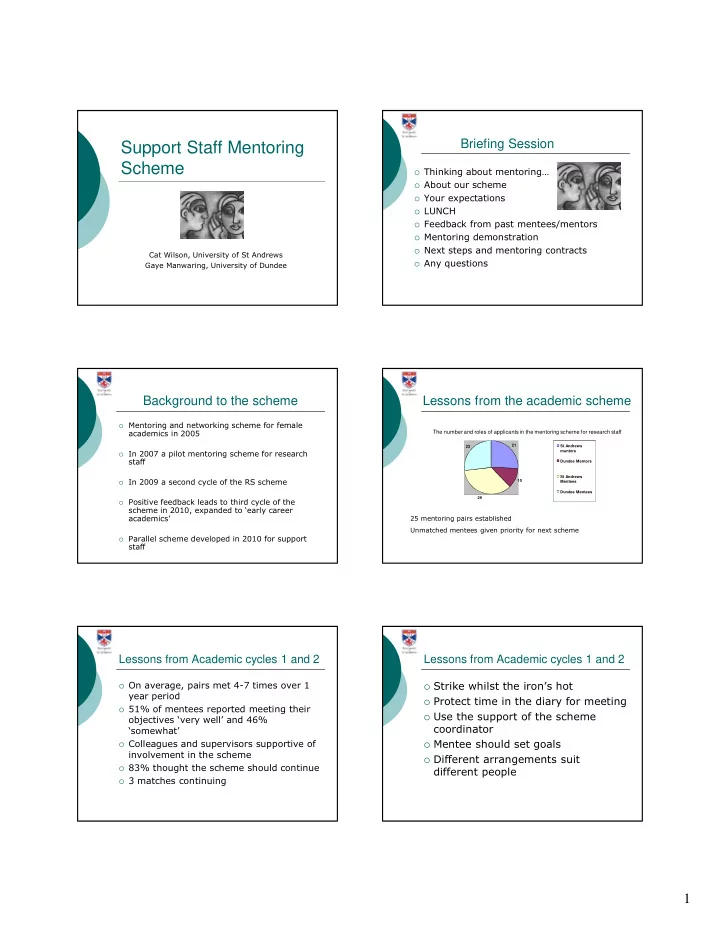

Briefing Session Support Staff Mentoring Scheme Thinking about mentoring… About our scheme Your expectations LUNCH Feedback from past mentees/mentors Mentoring demonstration Next steps and mentoring contracts Cat Wilson, University of St Andrews Any questions Gaye Manwaring, University of Dundee Background to the scheme Lessons from the academic scheme Mentoring and networking scheme for female academics in 2005 The number and roles of applicants in the mentoring scheme for research staff 21 St Andrews 22 In 2007 a pilot mentoring scheme for research mentors staff Dundee Mentors St Andrews In 2009 a second cycle of the RS scheme 10 Mentees Dundee Mentees 29 Positive feedback leads to third cycle of the scheme in 2010, expanded to ‘early career academics’ 25 mentoring pairs established Unmatched mentees given priority for next scheme Parallel scheme developed in 2010 for support staff Lessons from Academic cycles 1 and 2 Lessons from Academic cycles 1 and 2 On average, pairs met 4-7 times over 1 Strike whilst the iron’s hot year period Protect time in the diary for meeting 51% of mentees reported meeting their Use the support of the scheme objectives ‘very well’ and 46% coordinator ‘somewhat’ Mentee should set goals Colleagues and supervisors supportive of involvement in the scheme Different arrangements suit 83% thought the scheme should continue different people 3 matches continuing 1
The shape of our scheme A mentor can help a mentee to set realistic targets Approx 50 participants, 20 plan own personal development mentoring pairs become more self-confident Finite time period – 1 year accept challenges Mentee drives learn from experience Evaluation points – Dec + April develop suitable learning styles Support for mentees and mentors find useful resources Mentoring skills Mentor roles Supporter active listening & questioning Coach analysing & problem solving Advisor reflecting Networker summarising Teacher giving feedback Buddy supporting challenging Questionable mentor roles ??? A mentor may act as Assessor a mirror an eye opener Role model a sounding a door opener Protector board an idea bouncer Advocate a launch pad a feedback Counsellor a safety net giver a stick a problem solver a carrot an inspirer a motivator 2
Underlying principles Personal & professional development For mentee The mentee is in control o Prepare for supervision and review Personal responsibility o Learn to work reflectively Trust and confidentiality For mentor Developmental o Learn to listen, ask questions, provide Collaborative meaningful challenge Protected time for discussion o Help mentee to set realistic goals o Do not need to have answers and reflection o Discipline – stay in role, confidentiality Mentee concerns Structure of a mentoring meeting Beginning Agree contract Uncertainty, anxiety Excitement, anticipation Introductory stage Middle Main stage Growing confidence Concluding stage Frustration, mid-term blues End Reflection on process Relief, achievement Concern about future Introductory stage Main stage Manage environment Celebrate things going well and why Explore concerns & problems Welcome, put at ease Feedback: support & challenge Check expectations Discuss SMART targets Set time limits Explain purpose & process: contract 3
Concluding stage Mentoring is about Write down SMART targets communicating S Specific clear roles and responsibilities M Measurable outcomes and processes A Achievable support and challenge R Relevant T Time-constrained nurturing a good relationship Arrange future meeting developing your skills Reflect on process Your Expectations Reflections from a mentee Mentors: What do you expect from Louise Major, early career academic your mentee? scheme Mentees: What do you expect from your mentor? Reflections from mentors Reflections from mentors “We have met, revised my mentee’s CV and “My mentoring partner and I are well suited identified areas for progress. My mentee and we often discuss work and non-work has changed direction.” issues that I can’t discuss at my workplace. “This has given my mentee the confidence and knowledge that there are other I feel I can encourage and advise her given people going through similar problems, some of my experiences, and in return which makes the problems seem smaller.” she also acts as a ‘sounding board’ to give impartial advice.” 4
Reflections from mentors Demonstration “It caused me to think about my career, Listen to the interactions and how I could have done things Follow the sequence differently” Look at the body language “I’ve got a real feeling of giving something back. This has allowed me to do something positive with my experience, and given me the opportunity to think both critically and positively” Mentoring contracts and next steps Questions? About the mentoring contract… Mentees to initiate first meeting Any problems, contact me cmw9@st-and.ac.uk 5
Recommend
More recommend